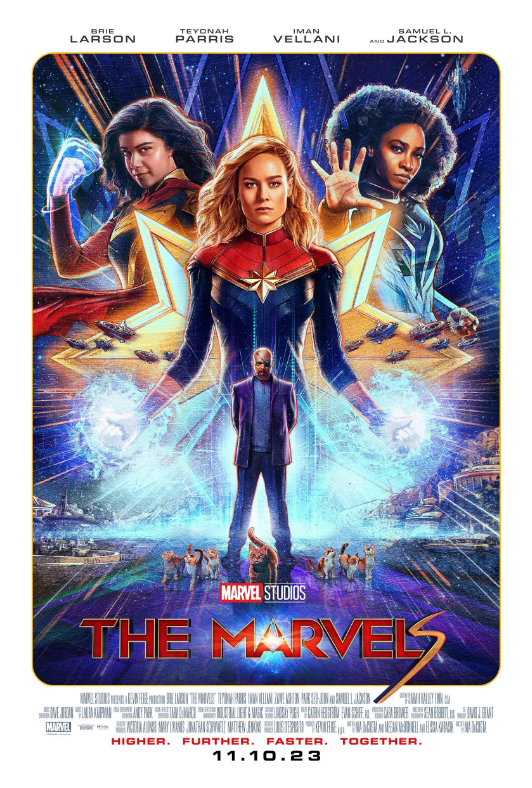Despite being incredibly formulaic — and still getting that formula wrong — a strong cast and joyful humor save “The Marvels.” Although doomed at the box office, “The Marvels” shows that the Marvel Cinematic Universe, or MCU, still has promise.
In the long overdue sequel to “Captain Marvel,” we follow Brie Larson reprising her role as Carol Danvers. Larson is joined by Teyonah Parris as Monica Rambeau, an ex-astronaut who gained her light-manipulation powers during “WandaVision,” and Iman Vellani as Kamala Khan, the young Pakistani girl who led “Ms. Marvel.” They join forces to thwart Dar-Benn, a Kree warrior seeking revenge for Captain Marvel’s wrongdoing.
The chemistry between Kamala, Carol and Monica is the best part of the film. Despite never appearing on screen together before this film, Vellani, Larson and Parris riff off of one another with tremendous skill. This trio brings the film to life, with the most brilliant being Vellani. With no acting credits to her name before the release of “Ms. Marvel,” she proves herself as an incredible actress. Her comedic timing is impeccable and often outpaces her older, more experienced costars.
The humor in this film is as goofy as the Marvel Cinematic Universe gets, and it handles it well. After “Thor: Ragnarok” proved that comic book movies can be comedies too, and “Thor: Love and Thunder” proved that maybe they shouldn’t, “The Marvels” feels like a breath of fresh air. Packed with laughs, even the jokes that go on for a little bit too long still make you smile.
This film’s cast and humor are worthy of praise, but the MCU’s movie formula sets this film up for failure. A cookie-cutter three-act structure, a predictable villain and a heartfelt personal subplot usually work well for this franchise, but it was a poor decision for this film. Developing an interesting villain, trying to set up a new trio featuring two characters we met on TV and getting us to care about their emotional history all in one hundred minutes was far too ambitious. The film doesn’t feel rushed — just empty. The villain is gone as soon as she arrives, and Carol and Monica’s emotional journey fails to gain the audience’s compassion.
The film waits until the very end to remind us that this is a Marvel movie. While this is a benefit to the film, it serves to remind the audience of the chaos of the franchise as a whole. A scathing Variety article was released earlier this month, providing a detailed account of the troubles at Avengers Tower — Marvel HQ in New York. Fans were finally properly informed about the unfavorable state of their favorite franchise — it’s not doing well.
Superhero films are fated to fade into obscurity, similar to the Westerns of the 1960s. We as consumers are incredibly fickle, and Kevin Feige’s ability to maintain our attention for over a decade is a marvel on its own. However, as the end of the Iron Man era was on the horizon, too much money and too little planning began an ending most executives were not planning for. With the expansion of the MCU from just a couple of movies a year to twelve television shows you have to tune in to weekly, superhero fatigue began to set in quickly. By the time “Secret Invasion” came out this summer, fans couldn’t be asked to sit through a five-hour movie haphazardly broken into episodes. But if “Thor: The Dark World” didn’t kill the MCU in 2013, a few bad TV shows shouldn’t have been a nail in the coffin for a multitude of fans.
The chronic issue affecting the MCU is a lack of planning and cohesion. The meeting following the release of “Avengers: Endgame” needed to be more comprehensive to effectively plan out the next phases of the MCU. Because of this, every project since then has felt incredibly disjointed. It’s hard to imagine that “Eternals” and “She-Hulk” are happening within the same universe. Even the films that feel connected undergo fractured production. Sam Raimi, the director of “Dr. Strange in the Multiverse of Madness,” had not seen all of “WandaVision,” a show about his main villain, before production began. Each new release leaves fans wondering, “What happens next?” However, not in the “I need to go see the next project” way that propelled the MCU to its popularity, but in a, “What does this have to do with the TV show I watched last week and the film I have to go see next month?” way.
Throughout the 2010s, every new Marvel film felt like it was building towards something, but especially after the release of this film, what am I looking forward to now? Yes, a rebuilding phase was necessary, but it doesn’t feel like we’re building toward anything. While this may seem like a hit piece written by a pretentious and scorned film major, I wish this wasn’t the state of this franchise. With “Loki” and “The Marvels” showing promise, and as I hold out hope for reboots like “Daredevil: Born Again” and “Fantastic Four,” I pray Kevin Feige can address the issues plaguing the franchise currently. However, if he can’t reign these problems in — is the age of the superhero film over?


